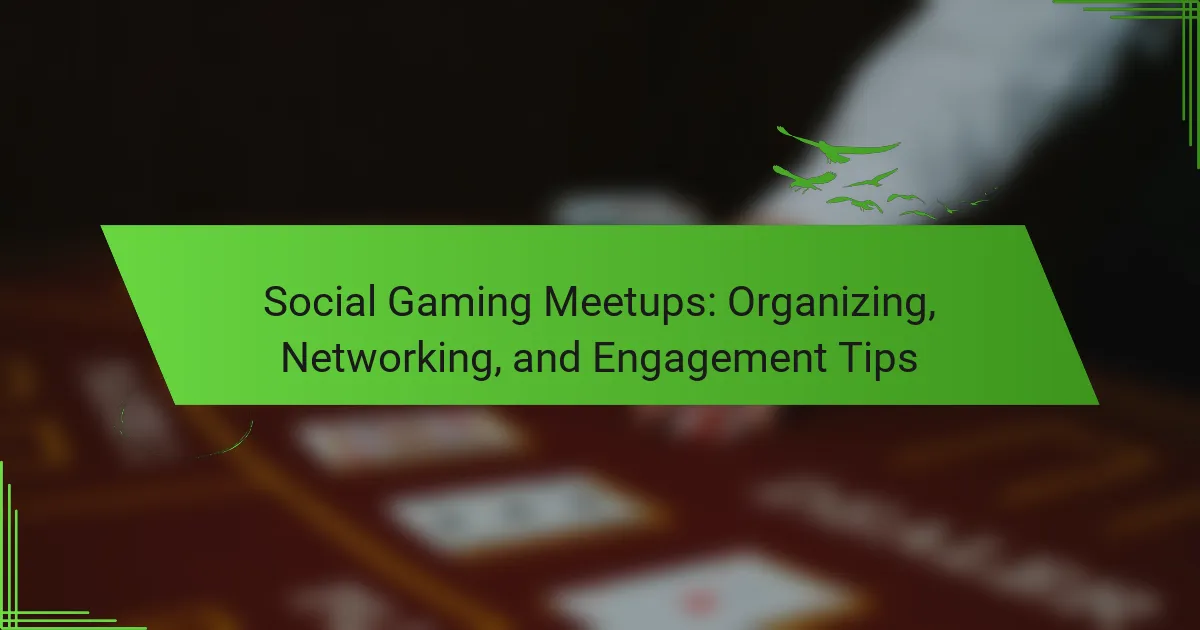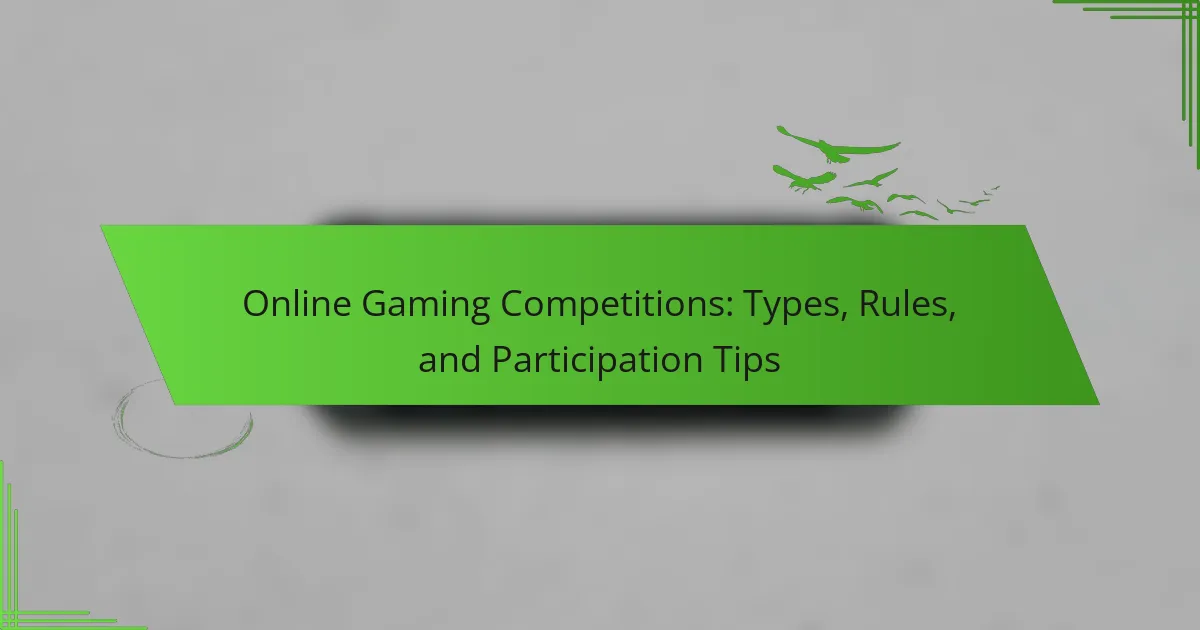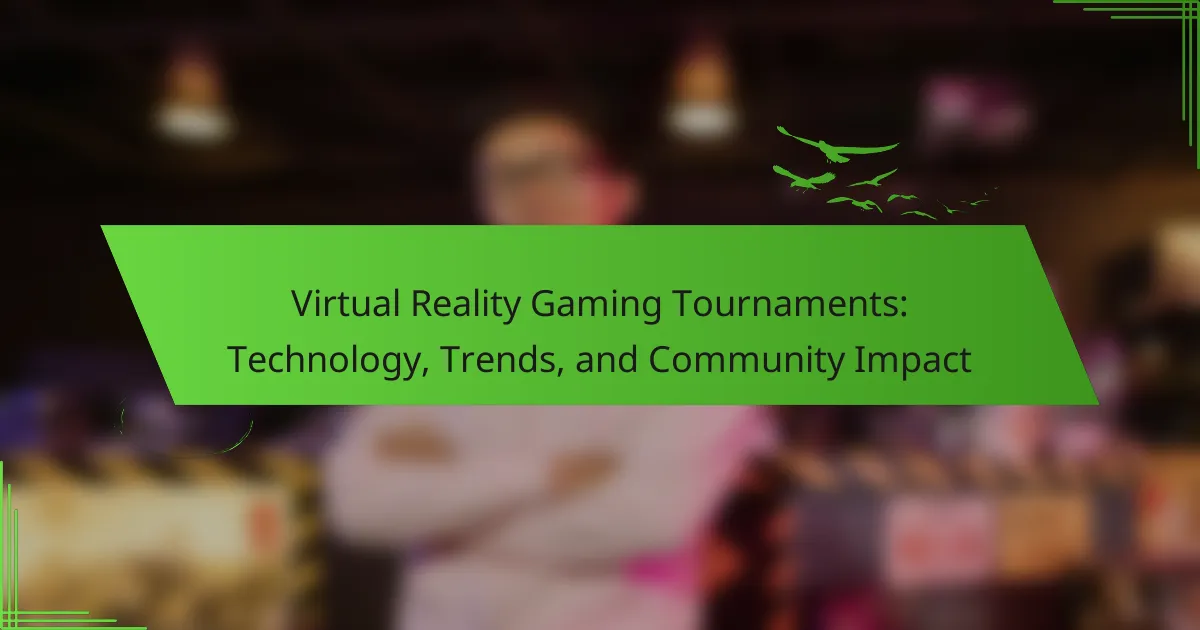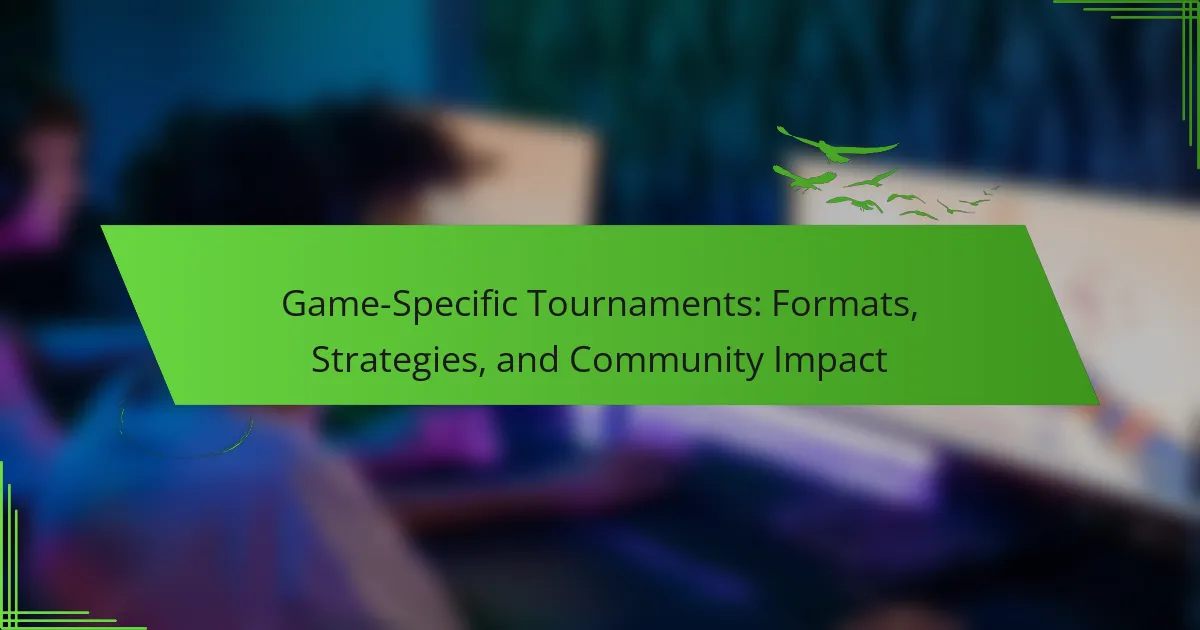Social gaming meetups offer a unique opportunity to connect with fellow gamers and enhance community engagement. Organize effectively with clear structures and suitable venues, while promoting through social media and gaming communities. Foster networking with icebreaker activities and thematic discussions. Incorporate interactive elements to maintain engagement and create memorable experiences for participants.
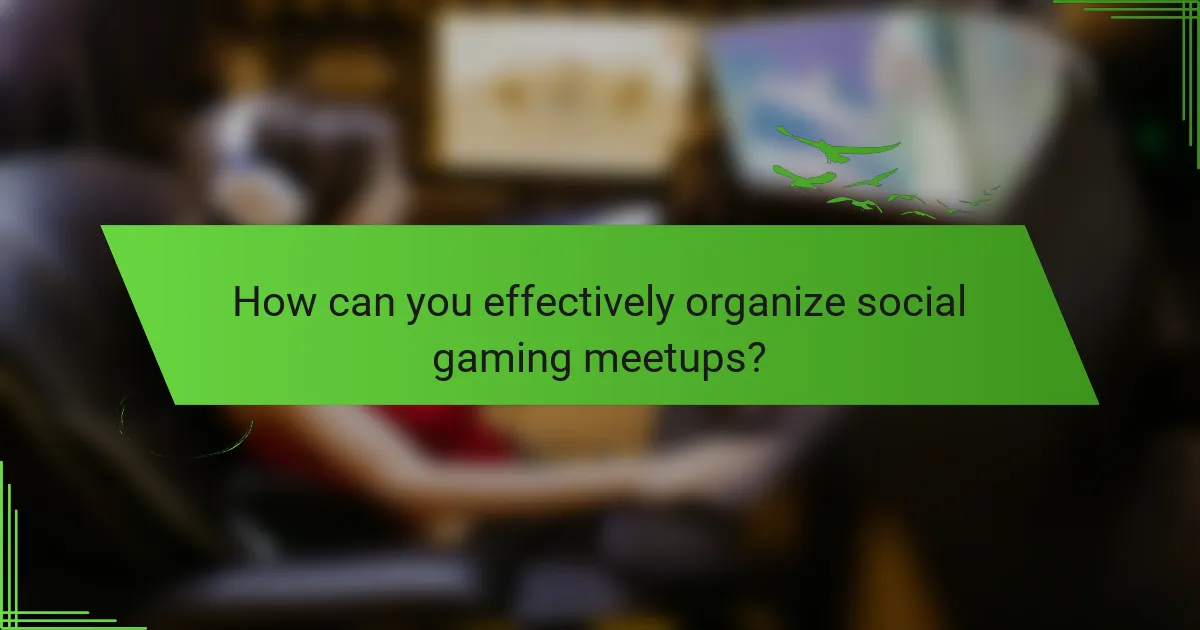
How can you effectively organize social gaming meetups?
To effectively organize social gaming meetups, establish a clear structure and engage participants. Start by defining the purpose and target audience for the meetup. Choose a suitable venue that accommodates the expected number of attendees and provides necessary gaming facilities. Promote the event through social media and gaming communities to attract participants. Encourage networking by incorporating icebreaker activities and discussion sessions. Finally, gather feedback post-event to improve future meetups.
What are the key logistical considerations for planning a meetup?
Key logistical considerations for planning a meetup include venue selection, attendee capacity, scheduling, and technology needs. Choose a location that accommodates the expected number of participants and is easily accessible. Set a date and time that maximizes attendance, considering participants’ availability. Ensure necessary technology, such as Wi-Fi and AV equipment, is available for presentations or gaming setups. Finally, plan for refreshments and materials to enhance the experience.
Which platforms are best for promoting your gaming meetup?
Social media platforms are ideal for promoting gaming meetups. Facebook, Discord, and Meetup.com are particularly effective due to their community features and user engagement capabilities.
Facebook allows event creation and targeted ads, reaching a broad audience. Discord fosters direct communication and community building among gamers. Meetup.com specializes in organizing local events, making it easier to connect with nearby participants.
Utilizing these platforms can enhance visibility and drive attendance at your gaming meetup.
How do you choose the right venue for your event?
Choose a venue that aligns with your event’s goals, audience size, and budget. Consider accessibility, ambiance, and available amenities. A central location enhances attendance, while a unique setting can boost engagement. Evaluate the venue’s capacity against your expected turnout to ensure comfort.
What timeline should you follow for organizing a successful meetup?
To organize a successful social gaming meetup, follow a structured timeline that spans several weeks. Start planning at least six weeks in advance to ensure adequate preparation and promotion.
1. **Weeks 1-2**: Define the meetup’s purpose, set a date, and choose a venue.
2. **Weeks 3-4**: Promote the event through social media, gaming forums, and local community boards.
3. **Week 5**: Finalize logistics, including equipment and refreshments.
4. **Week 6**: Confirm attendance, send reminders, and prepare for on-site registration and setup.
This timeline ensures effective organization and maximizes engagement opportunities.
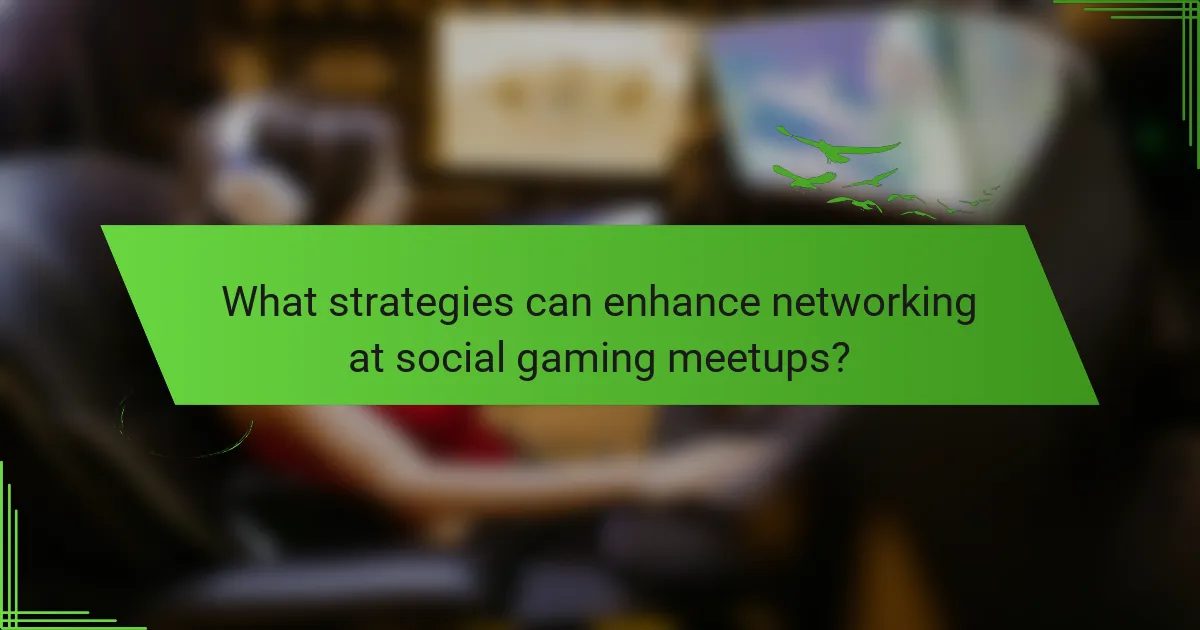
What strategies can enhance networking at social gaming meetups?
To enhance networking at social gaming meetups, prioritize interaction and engagement. Start by creating structured icebreaker activities that encourage participants to introduce themselves and share interests. Use thematic discussion groups to foster deeper conversations around specific games or genres. Implement a digital platform for attendees to connect before and after the event, facilitating ongoing relationships. Lastly, encourage collaboration through team-based games, which can strengthen bonds and create lasting connections.
How can icebreakers facilitate connections among attendees?
Icebreakers enhance connections among attendees by fostering interaction and reducing social barriers. They create a relaxed environment that encourages open communication and collaboration. Engaging in icebreaker activities can lead to stronger relationships, increased participation, and a more enjoyable experience at social gaming meetups. These activities often include games or prompts that facilitate conversation, allowing attendees to discover shared interests and backgrounds. As a result, icebreakers serve as a powerful tool for networking and engagement in social settings.
What role do group activities play in networking effectiveness?
Group activities enhance networking effectiveness by fostering connections in relaxed environments. Participants engage more openly, facilitating relationship-building and collaboration. Social gaming meetups specifically encourage teamwork and communication, creating a unique atmosphere for networking. Engaging in shared interests leads to stronger bonds and potential partnerships.
Which tools can assist in connecting gamers before and after the event?
Social gaming meetups can utilize various tools to connect gamers effectively. Platforms like Discord, Meetup, and Eventbrite facilitate communication and event organization. Additionally, social media channels such as Facebook and Twitter help promote events and engage attendees. Using gaming-specific networks like GamerLink or Guilded can enhance post-event connections. These tools foster community building and ongoing engagement among participants.
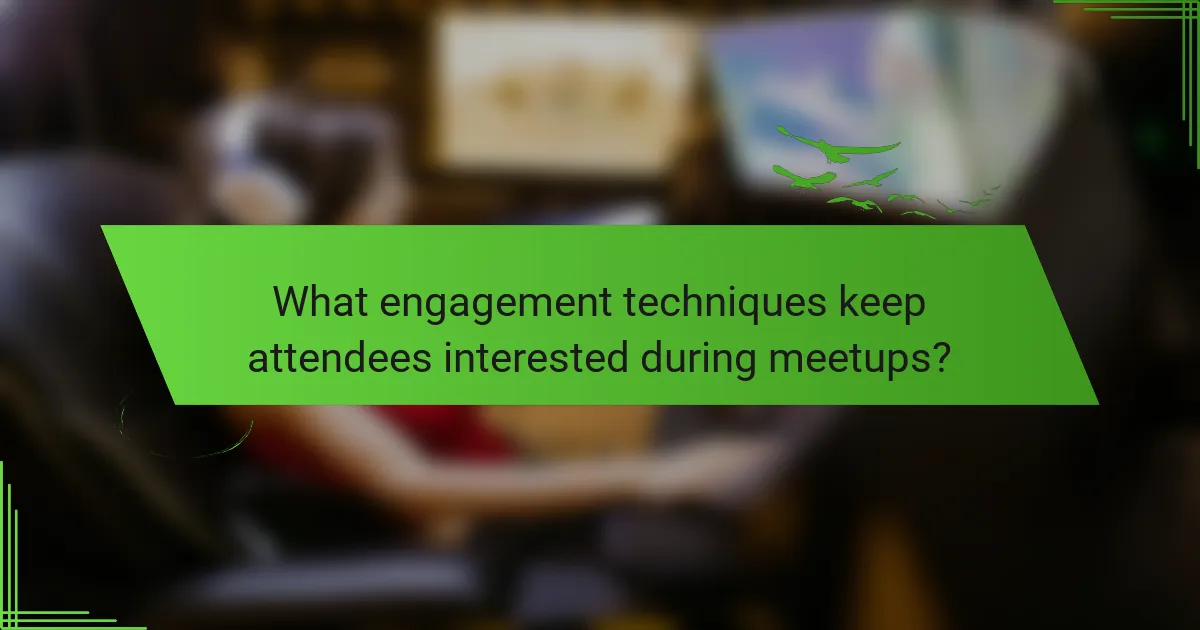
What engagement techniques keep attendees interested during meetups?
Engagement techniques that keep attendees interested during meetups include interactive activities, networking games, and live demonstrations. These methods foster participation and create a lively atmosphere. Incorporating social gaming elements can enhance interaction, making attendees feel more connected. Utilizing icebreakers encourages conversation, while structured networking sessions ensure everyone engages with others.
How can gamification improve participant involvement?
Gamification can significantly enhance participant involvement by making social gaming meetups more engaging and interactive. By incorporating game-like elements, organizers can foster competition, collaboration, and motivation among attendees.
Gamification introduces rewards and challenges that encourage participation. For example, leaderboards can track achievements, while badges recognize milestones. These elements create a sense of accomplishment and community.
Additionally, gamification can facilitate networking opportunities. Icebreaker games and team-based activities promote interaction, helping participants build connections. This collaborative environment enhances the overall experience, making meetups more enjoyable and memorable.
Incorporating gamification strategies can lead to higher satisfaction rates among participants, resulting in increased attendance at future events. Engaged participants are more likely to return and invite others, creating a thriving community around social gaming.
What types of content should be included in the meetup agenda?
A social gaming meetup agenda should include networking sessions, game demos, panel discussions, and feedback opportunities. These elements foster engagement and enhance participant experience.
1. Networking Sessions: Allow attendees to connect and share experiences.
2. Game Demos: Showcase new games and encourage hands-on play.
3. Panel Discussions: Feature industry experts to provide insights.
4. Feedback Opportunities: Gather participant input for future events.
How can feedback be utilized to enhance future meetups?
Feedback can significantly improve future social gaming meetups by identifying participant preferences and enhancing engagement strategies. Gathering insights through surveys or informal discussions allows organizers to understand what worked well and what needs improvement.
Incorporating feedback leads to tailored experiences that resonate with attendees, fostering a sense of community. For example, if participants express a desire for more networking opportunities, future meetups can include structured networking sessions.
Additionally, feedback can highlight unique attributes of the event, such as preferred game formats or desired themes, enabling organizers to create more appealing agendas.
Regularly utilizing feedback ensures that meetups evolve, maintaining high levels of participant satisfaction and engagement over time.
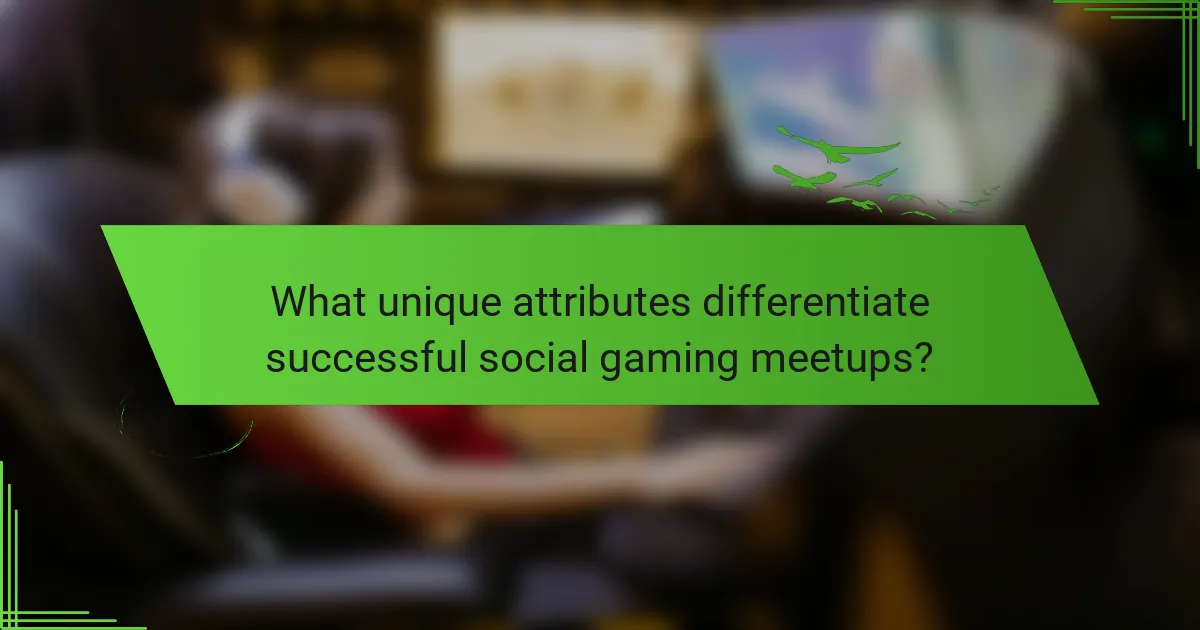
What unique attributes differentiate successful social gaming meetups?
Unique attributes that differentiate successful social gaming meetups include a strong community focus, diverse game offerings, and engaging formats. These meetups often foster inclusivity, allowing participants to connect over shared interests. Additionally, effective organization and clear communication enhance participant experience. Finally, unique themes or challenges can create memorable interactions and drive attendance.
How do regional gaming cultures influence meetup formats?
Regional gaming cultures significantly shape meetup formats by influencing participant expectations and engagement styles. For instance, cultures that prioritize community may favor cooperative gaming events, while those valuing competition might organize tournaments. Additionally, local traditions can dictate the types of games played and the social dynamics present. Understanding these cultural nuances helps organizers tailor experiences that resonate with attendees, enhancing networking and engagement.
What are the benefits of collaborating with local gaming communities?
Collaborating with local gaming communities enhances networking, fosters engagement, and boosts social interaction. This collaboration leads to shared resources and knowledge, creating a supportive environment for gamers. Participants often experience increased motivation and can discover new gaming trends and opportunities. Additionally, these connections can lead to organizing events that strengthen community ties and promote inclusivity.
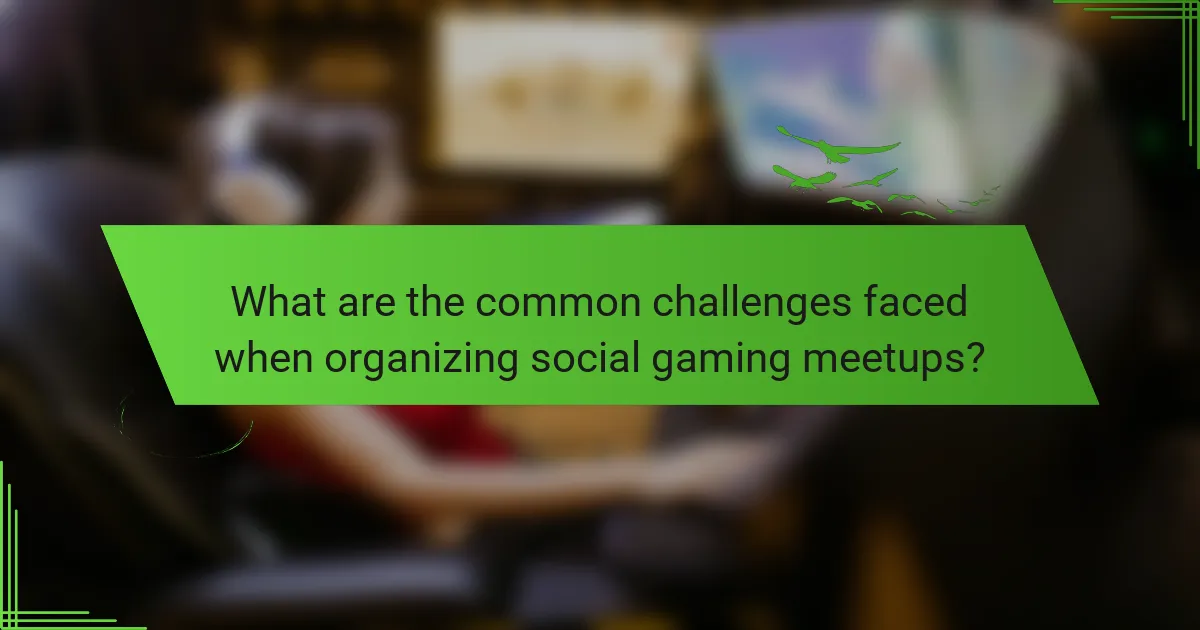
What are the common challenges faced when organizing social gaming meetups?
Common challenges in organizing social gaming meetups include venue selection, participant engagement, scheduling conflicts, and resource allocation. Each of these factors can significantly impact the success of the event.
Finding a suitable venue that accommodates the expected number of participants while providing the right atmosphere can be difficult. Engaging attendees is essential for a vibrant meetup; without proper activities or networking opportunities, interest may wane. Scheduling conflicts often arise as potential participants juggle personal commitments and other events. Lastly, managing resources, including budget and materials, is crucial to ensure a smooth experience for all involved.
How can you address low turnout at your events?
To address low turnout at social gaming meetups, focus on targeted marketing and community engagement. Leverage social media platforms to promote events and create a sense of anticipation. Collaborate with local gaming influencers to reach wider audiences. Offer incentives such as exclusive game previews or prizes to encourage attendance. Gather feedback post-event to refine future meetups and better meet community interests.
What solutions exist for managing diverse attendee skill levels?
To manage diverse attendee skill levels at social gaming meetups, implement tiered activities and mentorship. Organize games into beginner, intermediate, and advanced categories, allowing attendees to engage comfortably. Pair experienced players with novices for guidance, fostering a supportive environment. Encourage collaboration through team-based games, promoting skill sharing and social interaction.
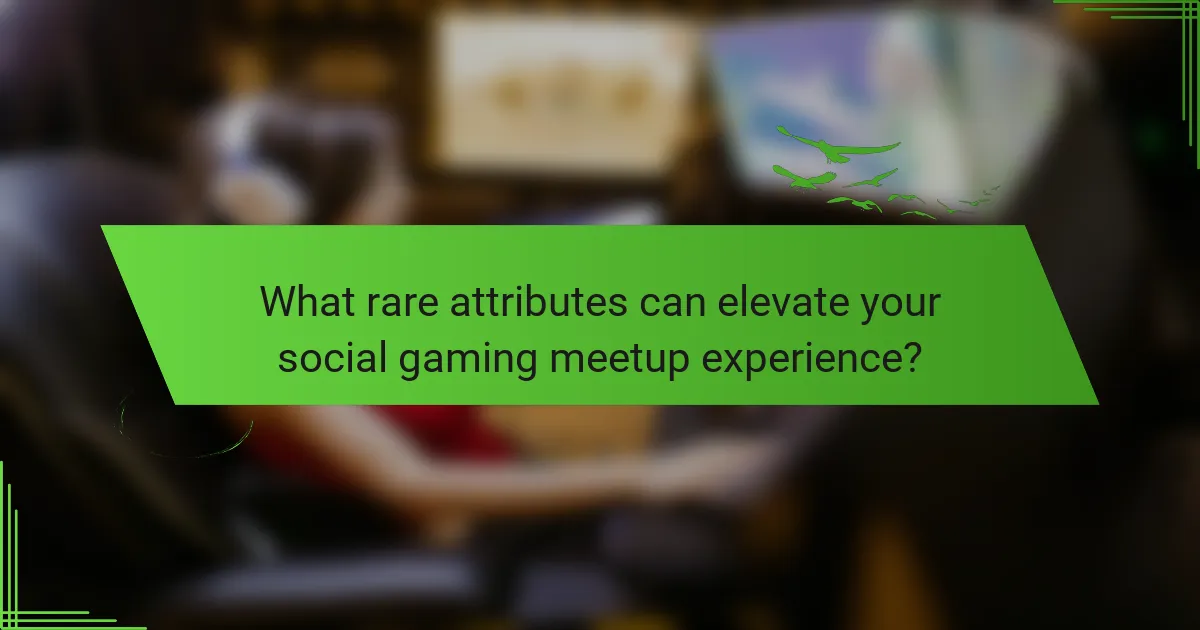
What rare attributes can elevate your social gaming meetup experience?
Incorporating rare attributes can significantly enhance your social gaming meetup experience. Unique themes, such as retro gaming or cosplay contests, create memorable engagement. Offering exclusive merchandise or prizes can incentivize participation and add excitement. Inviting guest speakers from the gaming industry can provide valuable insights and foster networking. Lastly, incorporating interactive elements, like live polls or collaborative games, can elevate the overall atmosphere and encourage attendee interaction.
How can themed meetups attract specific gaming audiences?
Themed meetups attract specific gaming audiences by creating focused experiences that resonate with particular interests. These events foster community, allowing participants to connect over shared passions, enhancing engagement and networking opportunities. Targeted themes can include popular game franchises, genres, or gaming styles, appealing to niche audiences. For example, a meetup centered around strategy games can draw enthusiasts who appreciate tactical gameplay, while a cosplay-themed event can attract fans of character representation. By aligning the meetup’s theme with audience preferences, organizers can ensure higher participation and satisfaction.
What unique partnerships can enhance the value of your meetup?
Collaborating with local gaming shops, tech companies, or community centers can enhance the value of your social gaming meetup. These partnerships provide access to resources, venues, and promotional support. For example, a local gaming shop may offer discounts on game purchases or host events, increasing engagement and attendance. Additionally, tech companies can provide sponsorships or equipment, enhancing the overall experience. Community centers may offer space at reduced rates, making meetups more accessible. These unique partnerships create a supportive network that fosters community and enriches the gaming experience.
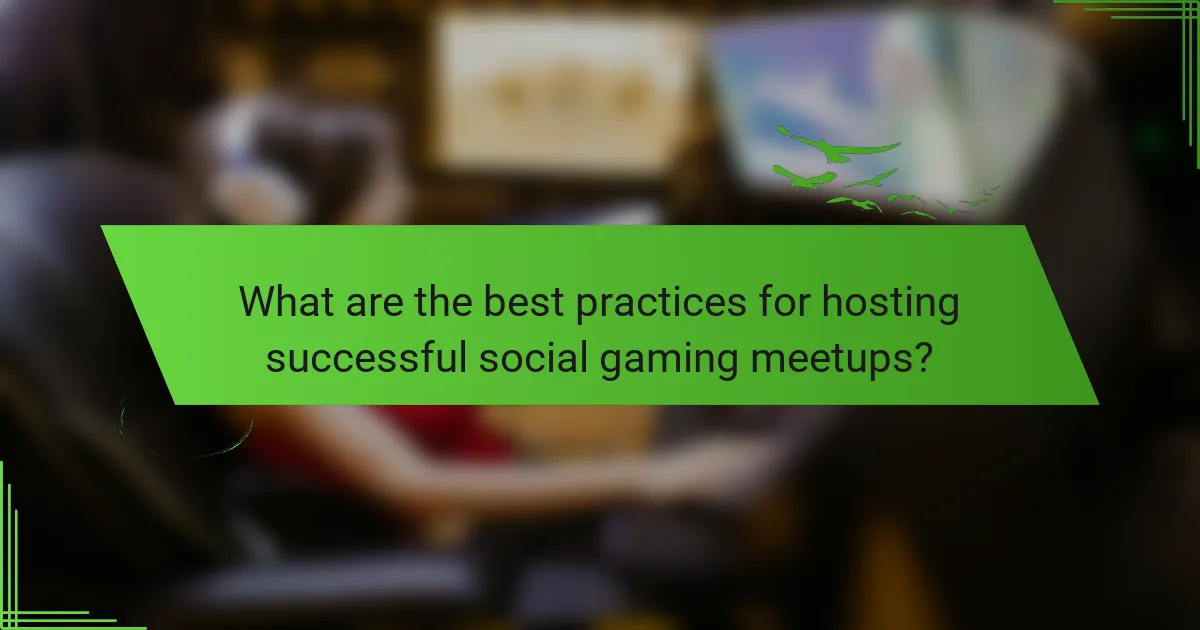
What are the best practices for hosting successful social gaming meetups?
To host successful social gaming meetups, focus on clear organization, effective networking, and engaging activities. Prioritize a well-defined agenda that includes game selections and time slots. Foster a welcoming environment by encouraging introductions and icebreaker activities. Utilize social media and gaming platforms for promotion and coordination. Ensure access to necessary equipment and resources, enhancing participant experience.
What common mistakes should you avoid when planning your event?
Avoiding common mistakes is essential for successful social gaming meetups. Focus on clear objectives, proper venue selection, and effective promotion.
1. Neglecting the target audience: Understand who will attend and tailor activities accordingly.
2. Poor venue choice: Ensure the location accommodates the expected number of participants and provides necessary amenities.
3. Inadequate promotion: Utilize social media and gaming forums to reach potential attendees.
4. Ignoring engagement strategies: Plan interactive activities to maintain participant interest and foster networking.
5. Lack of contingency plans: Prepare for unexpected issues, such as technical difficulties or low turnout.
How can you measure the success of your social gaming meetup?
To measure the success of your social gaming meetup, track attendance, engagement levels, and participant feedback. Attendance indicates interest, while engagement reflects the quality of interactions. Use surveys to gather feedback on experiences and suggestions for improvement. Analyzing these metrics helps refine future meetups.
What expert tips can improve the overall experience for attendees?
To enhance the overall experience for attendees at social gaming meetups, focus on interactive activities and networking opportunities. Engaging formats, such as tournaments or collaborative gaming sessions, foster connections. Utilize dedicated spaces for informal discussions, allowing attendees to share experiences and ideas. Incorporate feedback mechanisms to adapt future events based on participant preferences.
